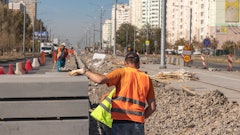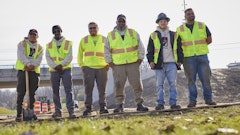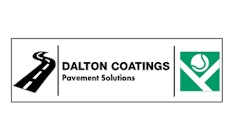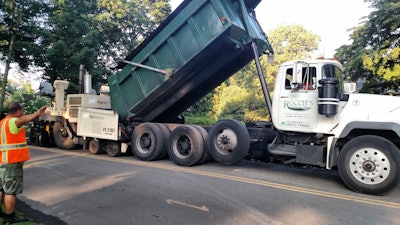
A stubborn refusal to fold, an understanding of the industry, a belief that Roccie’s Asphalt Paving is more than just a company, and a willingness to redesign a business model to fit a new economic reality has enabled owner Vinny Engongoro to revitalize and grow his Stamford, CT, business.
Like many contractors, Roccie’s survived the recession of the early 1990s and the longer-lasting recession that started in 2009. Roccie’s also survived the incredibly bad timing of an expansion acquisition that almost capsized the company.
“But I never turned my back on the commitment to the business because to me it’s more than just a place to go to work,” Engongoro says. “Number one, it’s my father’s legacy. Number two, it did a pretty good job of supporting my family over the years. And number three, it supported about a dozen other families.
“I’m just not that person that I could turn my back on the business or people that trusted me”. The situation was kind of “it is what it is” and you deal with it. But I realized sometimes you have to adapt to what the market gives you and what it allows you to take, and that’s what we’ve done.”
A Focus on Residential Work
Started in 1956 as a landscaping and outdoor masonry business by his father, Rocco, the company did very little paving until the mid-1960s.
“Just after the war my father started working for a landscaping company and the owner would hand some jobs over to him that the owner didn’t think fit what the company wanted to do. He gave my father customers that didn’t fit his business,” Engongoro says.
Eventually that side work became full-time work and Rocco Engongoro started his own landscaping company. “He didn’t want people calling him ‘Rocky’ and spelling the company ‘Rocky’s’ so he added the ‘i-e’ and that’s how the company got its name, Roccie’s.”
Occasionally Rocco was asked to pave a driveway. With bills to pay and a family to raise the answer was always “yes.” Rocco got some help from a paver friend to show him how it’s done. By the early 1980s Rocco was doing landscaping, outdoor masonry (such as field stone walls and flagstone patios) and paving. Vinny joined his father in 1985 after his stint in the U.S. Army as a paratrooper. By 1987 the company’s primary business was paving residential driveways.
“Our first really large growth spurt was in the mid-80s,” Engongoro says. “There was a huge boom, not only in real estate but in general. Young new families in affluent neighborhoods didn’t want their father’s old-style gravel driveway. They wanted blacktop so their kids can roller blade and play hockey or basketball. So it was somewhat of a market force that brought us in that direction.”
He says that rather than trying to grow in both landscaping and paving, Roccie’s took on the extra volume of paving work and got out of the landscaping business. At that point the company was made up of Vinny, his father and five field workers. “We didn’t have an office manager and we didn’t have a sales person. When you’re that size everyone sort of does everything,” he says.
“Driving to Higher Revenues”
“Then the stock market crashed and by 1989 the recession started to take root. Most of our days in 1990-1991 we were doing only a small patch and a couple of small sealcoating jobs. Business was very soft. Luckily we didn’t have any real debt and we had no non-production employees, so taking those small jobs sustained us through that period.”
Then from 1992 through 2007 Roccie’s experienced “a big run-up in the business.”
“Other than 2002, which was flat, we had no real retreat during those years,” Engongoro says. “We grew intentionally as much as we could. We were driving ourselves to higher revenues and we wanted to grow our business, but there’s only so much any one segment of the market can support.
“Over the years we acquired the right equipment, the right people, and the expertise so we decided to pursue different kinds of work within the paving arena and we started to take on some commercial work and even some select municipal projects, though the overall majority of our work was residential.”
In 1988 Roccie’s Asphalt Paving’s seven employees generated less than $1 million in work. By 2007 they’d grown to $3 million in sales with 12 people in the field plus a sales person and an office manager.
“We hired the office person the same time we hired the estimator because we were looking at more work,” Engongoro says. “Sales is a numbers game and the more work you look at the more you’re going to get, so there was more paperwork, more customer contacts, and more phone calls and we needed an office person to handle all that and keep track of it all.”
Then came 2008 and the Great Recession.
“Everything is Going to Change”
“I clearly remember when the poop hit the fan,” Engongoro says. “I was doing a high-end residential job in Greenwich, Connecticut when the landscape architect I was working for came over and asked me if I’d heard what happened to the stock market. His exact words to me were ‘Everything is going to change.’ And while I didn’t believe him at that moment, he was right.”
Engongoro says he thought the 2008 recession was going to be like the recession of 1990-1991. “It was tough but we got through that, and I thought this was going to be like that. That we were going to have a bad year or two but we’d tough it out,” he says.
But it was far worse. Not only was the recession deeper and longer, but at the same time the recession began, Engongoro was in the midst of negotiations to buy a large parcel of land and an excavating/site work business that was on the land.
“If there ever was a more perfect storm of what could happen, I can’t imagine it,” he says. “In 2007 we had a banner year and as it ended, I wanted to do a couple of things in the business. I was very much in love with myself is how I like to put it now. I felt like we couldn’t do anything wrong.”
So when an opportunity came along to buy a piece of property owned from an excavating company that I’ve been doing the paving for, Engongoro pursued the deal. He already owned two pieces of property and the opportunity with the excavating company started as a land deal.
“But then I realized we couldn’t make it work as a land-only deal so I asked him what he was going to do with his excavating business. And so it became a land and excavating business deal.”
As the financial crisis grew, an outright purchase became impossible and Roccie’s ended up leasing the land and owning the excavation business -- equipment, employees and all. “I wasn’t concerned because I felt that the economic problem was not going to be that bad,” he says. “Plus I’d already gone so far down the road to make the purchase that I felt I couldn’t just turn my back on it.
“Unfortunately the economy declined and our market declined. So here we had taken on more debt and increased our payroll to add excavating to our business, and the work just wasn’t there. And the paving work dried up too.”
Time to Make Tough Decisions
He says that he struggled for a good 18 months during 2008-2010 to try to make everything work -- but he could no longer ignore the reality. At its peak in 2007 Roccie’s did $3 million in revenue. It had $400,000 in capital reserves, zero dollars borrowed on their lines of credit, little to no receivables outstanding, no other debt, and owned two investment properties.
By 2010 that situation had changed dramatically. Roccie’s had burned through all its capital reserves, had maxed out two lines of credit, and had sold one of the investment properties. Essentially a $1.2 million-dollar shift in wealth.
“If we hadn’t done so well from the mid-90s through 2007 we couldn’t have gotten through that bad period because we wouldn’t have had the monetary fortitude to get through it,” Engongoro says.
However, difficult decisions could not be put off any longer. Selling off idle equipment and letting some people go was obvious and inevitable. “Mentally and spiritually it took me a long time to make that decision but I had to stop the bleeding,” he says. “One thing I learned is that good people land on their feet very quickly and these people all landed on their feet.”
“I didn’t have the cash flow and I didn’t have work, so I couldn’t pay my bills,” he says. So he sat down with the creditors, vendors and his bank. “I just told them the situation. I told them they’re not getting paid now but that they will get paid. It might be three months it might be six months, it might be more, but I assured them that I would pay them.”
He says the creditors, of course, were in the same situation. “Those companies have employees, too, and they have families that rely on them. Talking with them helped.” He and his suppliers came to an agreement where they would still sell him what he needed for cash – an agreement that enabled him to continue working. “Another important lesson I learned was the relationships I fostered over the years with my bank and my creditors was very strong -- strong enough to where when I told them they would get paid they believed me and they helped me out immensely,” he says. And after one year he’d paid everyone in full.
A Business Model for the New Economy
“Things never went back to the way it was. The pricing structure of 2007 never came back,” Engongoro says. “The pricing structure has not kept pace with the cost structure of the market including the cost of insurance, dumping, labor, and asphalt. As an example: in 2007 we were getting $3.20 per square foot to remove and repave a typical 3,500-square-foot driveway. Asphalt was $40 per ton. Dump fees to get rid of ripped out black top were practically non-existent. And base material was $5 per ton.
“Today asphalt is about $90 a ton, dump fees are up to $400 per load, and base material is $10 per ton. But the pricing has stayed stagnant if not lower than 10 years ago due to increased competition. If the pricing structure and margins were where they should be, we would be in the $4-$5 million area for our sales.”
To accommodate the new reality of fewer jobs and smaller margins, Engongoro created a new business model that calls for Roccie’s to continue to focus on the residential market, which other pavers often neglect (see sidebar). They would avoid the municipal market that was also overly competitive, bid select commercial work, put increased emphasis on pavement maintenance -- the work that had helped carry them through two recessions, they would reduce their house site work excavating efforts because margins were miniscule, and re-focus that division on paving-related projects requiring substantial site work and drainage.
“Mentally I couldn’t completely raise the white flag on excavation,” he says. “So we kept a couple of good paying home builder accounts and decided we were going to focus on excavation work with greater relation to our main core of work, asphalt paving.”
And the strategy worked: Roccie’s Asphalt Paving broke even in 2012, showed a slight profit in 2013, and has been more profitable each year since. Today Roccie’s generates $3 million in annual sales -- 80% from residential work and 20% from commercial jobs. The paving business at $2.3 million is slightly smaller than it had been, and the excavation business at $700,000 is much smaller. “You trim the fat and do what you have to do to get what the market will yield you,” Engongoro says.
“In a continuing commitment to the business and the residential market, we recently acquired another small paving business that had market share connected to our major areas and a similar focus on residential paving,” he says. “The addition of the new market share has helped increase revenues for Roccie’s and help expand our territory as well as provide a continuation of another well-known brand in our area.”
The combined organizations will offer additional services such as chip seal. Together, both companies had more than $4 million in revenues for 2018 with a greater market share of paving and pavement maintenance serving lower Fairfield County Connecticut and lower Westchester County New York.
“Buying another paving business was scary after what I had been through. But my military years helped teach me a few life lessons,” Engongoro says. “Mistakes are painful. But you can’t just crawl into a hole and curl up in a ball. You have to bury your dead, learn from your mistakes, put more thought into major decisions, and keep moving forward.”




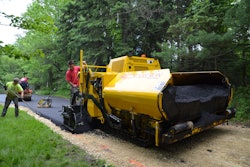
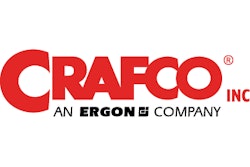
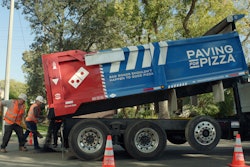




![Lee Boy Facility 2025 17 Use[16]](https://img.forconstructionpros.com/mindful/acbm/workspaces/default/uploads/2025/09/leeboy-facility-2025-17-use16.AbONDzEzbV.jpg?ar=16%3A9&auto=format%2Ccompress&fit=crop&h=135&q=70&w=240)


